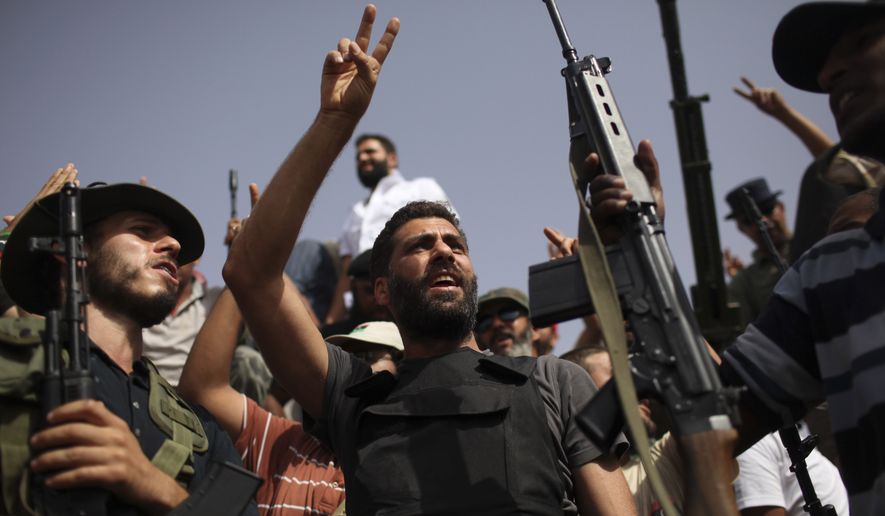Jihadists among the Libyan rebels revealed plans last week on the Internet to subvert the post-Moammar Gadhafi government and create an Islamist state, according to U.S. intelligence agencies.
U.S. officials said spy agencies are stepping up surveillance of Islamist-oriented elements among Libyan rebels. A government report circulated Tuesday said extremists were observed “strategizing” on Internet forums about how to set up an Islamist state in Libya after the regime of Col. Gadhafi is defeated.
“Several forum participants have suggested that, following a transitional stage, the battle should turn against secularist rebels and members of the [rebels’] Transitional National Council,” the unclassified report stated.
Some U.S. officials sought to play down the remarks by noting that such Internet postings are not always accurate measures of jihadist plans.
The report said the jihadists’ strength and influence on the ground “are uncertain at this time.”
However, the report said the jihadist plotting coincided with the high-profile emergence of Abu Abdallah al-Sadiq, a former leader of the al Qaeda-linked Libyan Islamic Fighting Group (LIFG) and now a leading rebel. He is currently known as Abdel Hakim al-Khulidi Belhaj and led rebels in overrunning Col. Gadhafi’s Tripoli compound.
A U.S. official familiar with intelligence reports on the region said there are concerns that some LIFG members remain committed to al Qaeda and others may be temporarily renouncing their ties to the terrorist group for “show.”
“Some members of LIFG in the past had connections with al Qaeda in Sudan, Afghanistan or Pakistan, and others dropped their relationship with al Qaeda entirely,” the official said.
“It seems - from their statements and support for establishing a democracy in Libya - that this faction of LIFG does not support al Qaeda. We’ll definitely be watching to see whether this is for real or just for show.”
A defense official familiar with jihadist strategy said Islamists likely will emerge in power from the turmoil expected after the demise of the Gadhafi regime and the West will be partly to blame.
“We’re helping pave the way for them” through NATO airstrikes and other support, he said.
About 1,000 jihadists are operating covertly in Libya, Noman Benotman, a former Libyan al Qaeda member, told The Washington Times in March.
According to a translation of the forum exchanges, Libyan Islamists view the fall of Tripoli to rebels as the initial phase of a battle to take over the country.
Jihadists were urged to prepare for the next stage in the battle: taking on secular rebels and the interim National Transitional Council, sometimes called the Transitional National Council, the secular political organization that is mainly pro-democratic.
The jihadists want to set up an Islamist state ruled by Shariah law.
A jihadist writing as Asuli Mutatari, stated on the Shumukh al-Islam Network forum that “the real war will be fought after the fall of the tyrant [Col. Gadhafi] and after the establishment of a transitional democratic system.”
“After the awakening, we will fight those outside the [Islamic] law,” he stated.
Another forum posting urged Islamists to “quickly take control of cities with economic resources and strategic locations and establish Islamic courts there.”
A jihadist identified as Abu Abra’ al-Muqadas said the National Transitional Council must be neutralized because it will never allow anyone calling for an Islamic state to be part of the new government.
“They know that merely suggesting the application of Islamic law will cause Western countries to stop their support,” he said.
A posting by a forum member named Gullam Ashab al-Akhud said the National Transitional Council should be liquidated and replaced by a transitional council of Islamic Salafi jihadi scholars in Libya.
A second Internet forum, Ana al-Muslim, quoted Ayoub al-Jaza’iry as saying that thousands of Islamists in Libya have been trained by al Qaeda and are “working silently in sleeper cells.” He warned jihadists to keep a low profile to avoid alerting the United States to its power.
Some of the jihadists criticized NATO military support to the rebels and said post-Gadhafi Libya should not allow outside assistance. Some also urged the assassinations of secular National Transitional Council leaders.
Mohamed al-Jaza’iry stated on the Ana al Muslim Network that the next phase of the revolution should be the expulsion of foreign bases and reduction of foreign influence.
“The Libyan people must … turn their guns on the Crusader occupiers, along with collaborators and traitors,” he added.
The comments reflect an increase in Islamist rhetoric since the fall of Tripoli, but the number of hard-line Islamist and the extent of their influence or control is not known, the report said.
A Dec. 9, 2009, cable made public by the anti-secrecy website WikiLeaks revealed that the Gadhafi regime released more than 200 jihadists, including half of the imprisoned LIFG members, after they publicly renounced violence and claimed to have adopted a new code for jihad. The move was an initiative by Col. Gadhafi’s son Seif al-Islam and the Gadhafi International Charity and Development Foundation.
Skeptics dismissed the effort as a temporary shift in tactics for the jihadists in exchange for winning their release from detention.
• Bill Gertz can be reached at bgertz@washingtontimes.com.




Please read our comment policy before commenting.